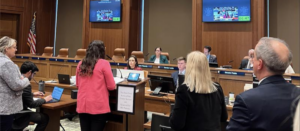As the United States Supreme Court’s 2022 term is coming to an end, there are still two significant cases for which we are expecting opinions: 303 Creative LLC v. Elenis and Groff v. Dejoy.
303 Creative LLC v. Elenis
Lorie Smith, the plaintiff, owns 303 Creative, LLC., a graphic design firm. She is seeking to expand her company and include wedding websites; however, due to her religious beliefs, she wants to only honor the union of one man and one woman as God established.
She sought to put a message on her site explaining why she will focus on one-man-one-woman weddings. The state of Colorado, however, claims she would be violating the state’s Anti-Discrimination Act (CADA) which prohibits discrimination in businesses on the basis of several characteristics, including sexual orientation. There are two relevant provisions, the Accommodation Clause and the Communications Clause. The Accommodation Clause prohibits companies that sell or give services to the public from discriminating based on protected characteristics including sexual orientation, and the Communications Clause prohibits businesses from displaying a statement that an individual is unwelcome at the establishment due to a protected characteristic.
The Issue of the case centers around whether Colorado can force Lorie Smith to create a website promoting messages that contradict her religious beliefs. Smith argues that the two provisions of CADA violate her freedom of speech rights as an artist. She argues that the state does not have a compelling interest in enforcing CADA in this instance because there is no compelling interest in ensuring someone’s access to an individual’s “artistic product.”
The state says that it does not deny Smith the ability to express her views, but it is prohibiting Smith from advertising her objection to designing wedding websites for other types of couples. This case echoes the famous Masterpiece Cakeshop, Ltd. v. Colorado Civil Rights Commission case where a baker’s First Amendment’s rights were violated when the state tried to force him to design cakes that violated his deeply held religious convictions. The Supreme Court ruled in favor of the baker saying that the commission’s ruling violated his free exercise rights.
Groff v. Dejoy
In the Groff v. Dejoy case, Gerald Groff, an employee with the United States Postal Service (USPS), took a position with the understanding that he would not work on Sunday because of his religious beliefs. USPS said they would provide accommodations by finding employees to cover any Sunday shifts.
However, there were many Sundays where the shift was not covered, and since Groff did not work because of his Christian beliefs, he was forced to resign. Title VII of the Civil Rights Act of 1964 “prohibits employment discrimination based on race, color, religion, sex and national origin.” The Supreme Court in Trans World Airlines v. Hardison, under Title VII of the Civil Rights Act of 1964, set limits to the arrangements that private employers needed to make for employees who needed accommodations for religious practices. This case allows employers to avoid accommodation if they created more than a de minimis cost.
The case asks the court to take a look at the de minimis cost standard of “undue hardship” that justifies employers from not accommodating an employees’ request of observing religious practices?
Groff sued USPS under Title VII saying that USPS did not make legally-required accommodations for his religious beliefs instead forcing him to resign. The district court determined that Groff’s request for Sundays off poses “undue hardship” on USPS and, therefore, granted summary judgement for USPS.
But Groff contends that burdening co-workers itself does not constitute “undue hardship” and that the de minimis standard does not equate to “undue hardship.” Additionally, employers must show how the accommodations represent an “undue hardship” that disrupts their business, something USPS did not do. For example, The Americans with Disabilities Act uses “undue hardship” language while requiring employers to show that the accommodations would have a significant cost.
There are also discussions as to Hardison being clarified instead of overturned. The Solicitor General (SD) admits that “de minimis” is not synonymous with “undue hardship” but that the lower courts have used it in that way. The SG argued the Court needs to uphold Hardison on the facts with consistent views on what constitutes “undue hardship” including “the consistent payments of premium wages, regularly operating shorthanded, or altering a collective bargaining agreement.”
Both cases are important to First Amendment protections, and we pray the Court gives a strong defense that can provide clear guidance for lower courts of the importance of a citizen’s Free Speech and Religious Liberty rights.
—
Shelby Barrow is CWA’s Ronald Reagan Memorial 2023 Intern for our Legal Studies Department.






